Cool Cats on Parade
(Marie-mail #53)
SERENGETI
SEPTEMBER 24
Some people are better at animal-spotting than others. But in safari
Africa, even the most near-sighted person - who has lost their glasses
- can be an ace spotter. Just look for the other cars.
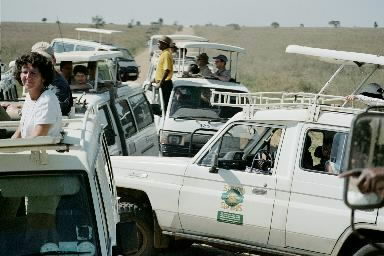 just look for the other cars
just look for the other cars
We'd returned to camp after our morning safari, had lunch, and started
out again. Someone had spotted an at-rest Land Rover, full of cameras
and attached tourists.
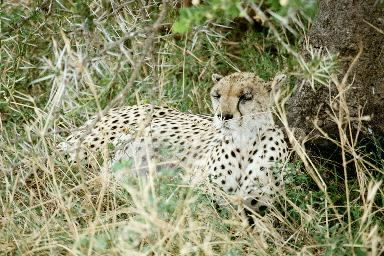
"Leopard," exclaimed a sightseer. A leopard had lazily plastered
himself over a large branch, and was nearly camouflaged by his handsome
spots.
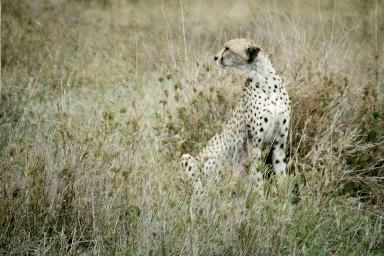
I settled back and relaxed. I'd topped off my "big five," seen
hundreds of non-big five, and was ready to zone out for the rest of the game
drive.
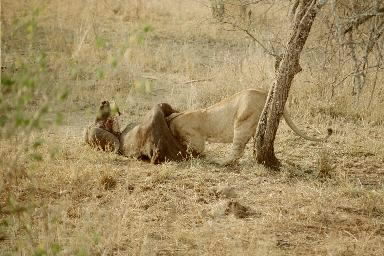 snack for a lion
snack for a lion
But Africa still had a few surprises. We came across a crowd of
vultures on a tree branch (another popular spotting technique is to
first spot vultures - the game will follow). Beneath them were four bloated lions, obviously overstuffed on dinner. A lioness was enthusiastically tearing
into a hollowed-out half-buffalo nearby. She'd disappear into the buffalo's
chest for minutes before reappearing for a quick breath. The vultures patiently
waited their turn.
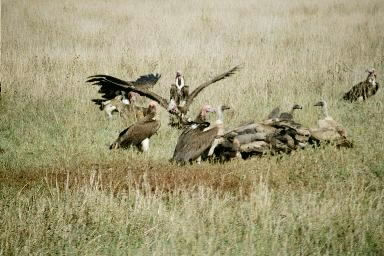 waiting their turn
waiting their turn
We viewed a hippo-less hippo pool and an immobile croc before heading
back to camp.
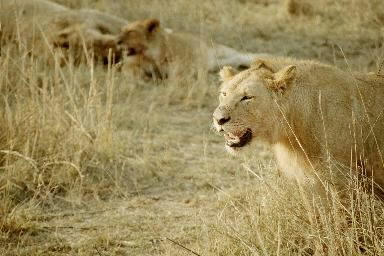
The lions came near our campsite at night, but not so close that we
were scared. From within my tent, I heard a few distant growls but
couldn't even stay awake long enough to be frightened.
SERENGETI TO NGORONGORO CRATER
SEPTEMBER 25
I woke up feeling like the whole notion of "comfort camping" was
ridiculous. I'd had more comfort on earlier trips, but at a third the
price. As near as I could figure, the added comforts amounted to:
-canvas camp beds (they hurt my back and I used mine to store luggage)
-a dining room table (in most budget safaris, you balance your dinner
plate on your lap)
-big tents
-a staff member who put tents up and down
-a cook was on staff and we didn't have to do dishes
-we had a staff of seven for seven clients
-we had nice Land Rovers (but so did all the local Arusha outfitters).
Comfort camping wasn't a bad thing, but I'd happily eat from my lap
and put up my own tent if it meant a $400 difference. And I wasn't thrilled
with the "suggested tip" sheet we'd gotten on day one. Our suggested tips
amounted to more than the QE2's.
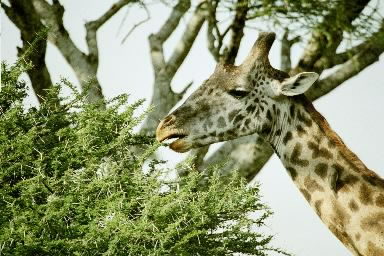
Later, I discovered that the expense and overabundance of staff was
neither Guerba's fault not the result of the excesses of comfort
camping. It was just Tanzania, with its high park entry fees and custom of using several staff for a job that one could do. It's probably a result of years of tourism and "great white hunter" Hemingway-esque safaris. If you're looking for a bargain, go to Namibia, Zambia, or Zimbabwe, and leave Tanzania to its high cost of tourism.
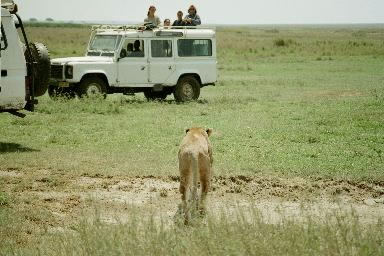
But in the budget countries, there was no matching the Serengeti for
cats. As we left camp, we spotted a gaggle of Land Rovers, the
occupants happily clicking their cameras at two white-bellied cheetahs, who
feigned a total lack of interest in the proceedings around them.

We stopped for a brief tour at the Serengeti visitor's center. It was
infested with my old pals the rock rabbits - or penguin-rats - from
Table Mountain. This little brown furry rodent is the closest relative the
elephant has.
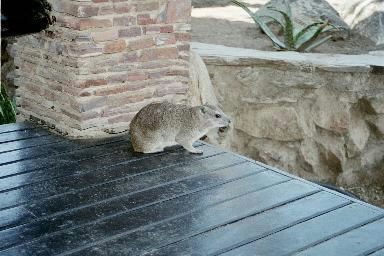 rock rabbits
rock rabbits
Our drivers gently reminded us to tip the Visitor's Center guide. This
annoyed me as I reckoned that our $310 local payment should cover this
sort of thing.
The afternoon game drive took us past our second leopard and third
cheetah. We were still spotting lions, gazelle, warthogs, giraffe, and
zebra too. They were just so commmon they didn't even register.
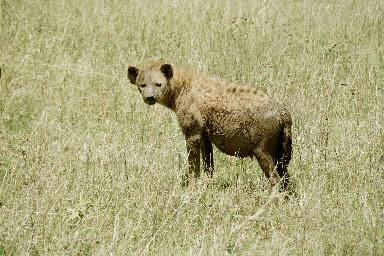 hyena with an attitude
hyena with an attitude
Wilfred, our Tanzanian guide, was the most interesting sight that
afternoon. He surprised all of us by being expertly informed about the
politics of Sweden. He proceeded to tell us about the economics of getting a car into Tanzania. He'd never done it himself, but knew people who'd bought cars in Dubai or Jeddah and then shipped them back. Some had even managed to
smuggle their cars in.
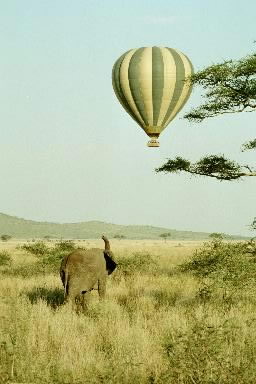 Good morning, Mr. Balloon!
Good morning, Mr. Balloon!
A long driver took us out of the park and back onto Masai lands.
Several blanket-clad Masai women were walking home to their village, so
Wilfred slowed down.
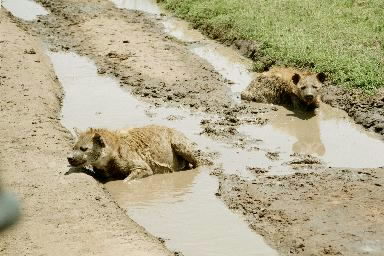 cooling down
cooling down
"Where have you been?" He asked them in Swahili.
"Shopping at Kimba Village." They women were coming back from the
Masai equivalent of a day at the mall.
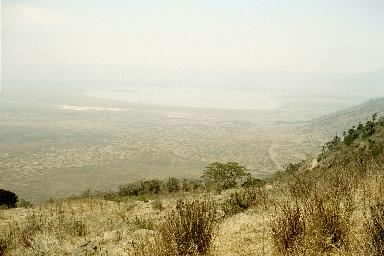 Ngorongoro Crater
Ngorongoro Crater
Wilfred pulled into the Simba Camp on the edge of Ngorongoro Crater.
"Marie, how long have you been driving?" He asked.
"Seventeen years or so," I replied.
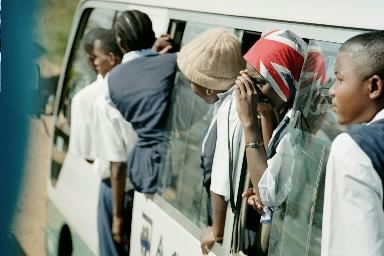 Tanzanian kids like animals too
Tanzanian kids like animals too
"I can tell. You've been driving all day."
Subconsciously, probably because I'd been in the passenger seat in a
right-hand drive car, I'd been pressing an imaginary brake and clutch,
while moving an imaginary gearshift. I hadn't even noticed, and was still not
totally convinced.
NGORONGORO CRATER TO KARATU
SEPTEMBER 26
"On the crater rim is the dirty Simba Camp." --Lonely Planet "East Africa," page 448.
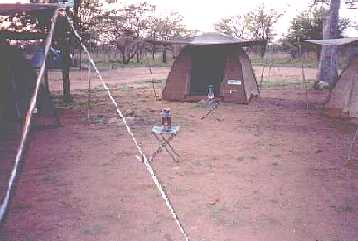 one of the Guerba campsites
one of the Guerba campsites
Our cold night, while chilly, didn't live up to the hype. Erasto had
invited us to book rooms in the lodge if we were worried about the
cold.
We were two Americans, four Brits, and one Norwegian. "Cold" was
defined as something completely different to us than to Erasto the
Tanzanian.
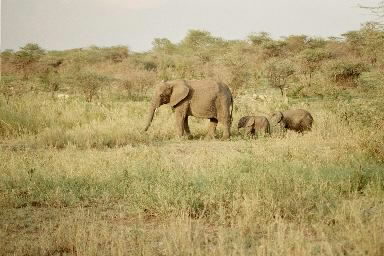
If, however, he'd mentioned that Simba Camp was crowded, had just a
few gross flushing toilets and only filthy cold showers, we might have been
more enthusiastic about a night in the lodge.
"Where's your spirit of adventure?" joked one of the Brits. I
attempted to give him a withering "don't you spirit-of-adventure me you pansy on a two-week holiday" look, but succeeded only in looking silly.
Ngorongoro Crater is a unique ecosystem -- and one of Tanzania's most
overtouristed parks, famous for its animals who are spoiled rotten by
year-round access to grass and water. The wildebeest from the Serengeti
migrate to Kenya during the dry season -- the Nrogongoro wildebeest lazily stay
home.
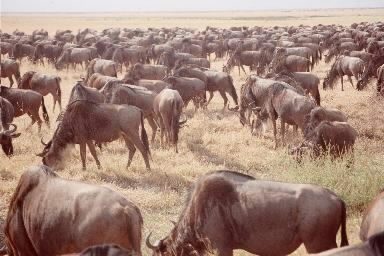 wildebeest
wildebeest
We'd been astonishingly lucky so far, with our tree-lion, two leopard,
feasting lions, and three cheetah. We jokingly demanded a rhino
sighting from Erasto, who in all seriousness reminded us that the wild was not a zoo.
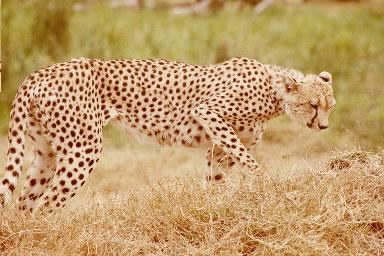
We left our "cold" Simba campsites on the crater rim without our
breakfasts. Everyone had caught on last time that having tea and a few
crackers at six meant we'd be ravenous by "brunch," and for once I was not the
only one grumbling. But I was the only one who quietly put hot water into a mug
and ate instant oatmeal when no one was looking.
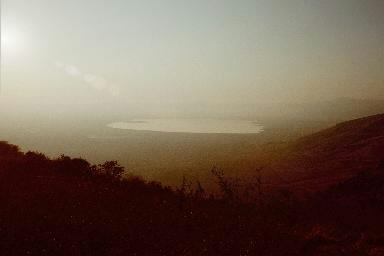 Ngorongoro Crater
Ngorongoro Crater
We drove down into the crater.
It was a disheartening morning. We saw a few zebra, some wildebeest,
and the occasional warthog. The cold turned to hot sun, and flies set
upon us. We were all hungry and dehydrated. Guerba had seen fit to supply us
with water, but we weren't drinking enough. No one wanted to make a toilet run in the middle of lion-country. You couldn't just duck behind a bush. Any
animal or snake could be waiting there.
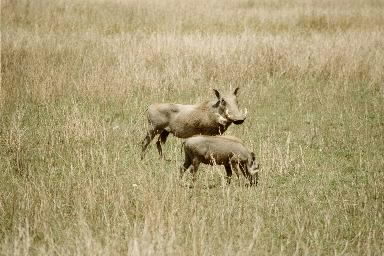 warthog pals
warthog pals
We'd all been hoping to spot a rhino but were disappointed to see
almost nothing.
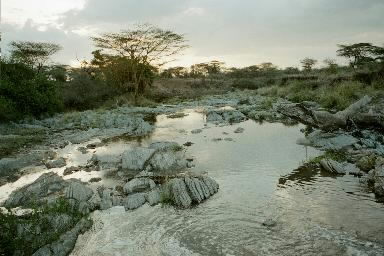
Finally, Charlie mentioned that brunch might be an appealing prospect,
and we turned towards a picnic area.
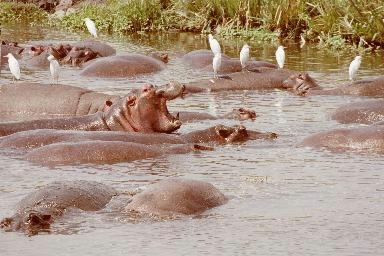
En route were two consolation prizes. The first was a hippo pool. I'd
seen hundreds of hippos at this point, and thought there were no hippo
surprises left. I was wrong, however, as the Ngorongoro hippos were all
enjoying their morning by doing eskimo rolls in the water.
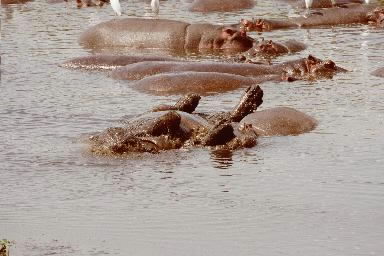 eskimo roll hippos
eskimo roll hippos
We watched their broad gray backs alternate with rose-colored bellies,
and then moved on to an algae-colored lake that was infested with
bright pink flamingoes.
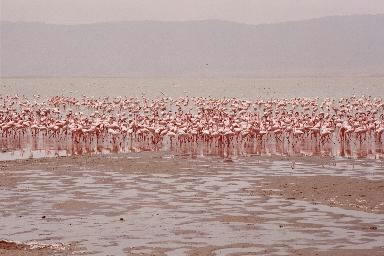 pink flamingos
pink flamingos
Our disappointment had lessened by the time we got to the picnic area.
The toilets there actually flushed, demonstrating what the wildebeest
already knew -- that Ngorongoro had plenty of water.

"Do not feed the animals," read the sign by the lakeside picnic spot.
I barely noticed it.
"Be careful of the black kites," warned Erasto. "They will try to take
your food."
This registered on a slight level with me -- I should keep an eye on
my food, yeah, right, whatever.
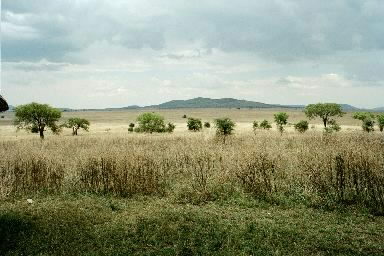 plains of Africa
plains of Africa
Our brunch consisted of cold vegetable empanadas, spicy fried
meatballs, and greasy "sweet pancakes." Lunch everyday featured "sweet
pancakes," a greasy fried dough that I found revolting. I quietly
placed mine on a nearby rock. The birds were welcome to it.
A minute later, an enormous kite swooped in, encouraged by my silent
offering. It snatched the empanada from my hand and took it to a
distant branch before I comprehended the situation. Another one went for Lucy's food, but she hid her empanada under her shirt.
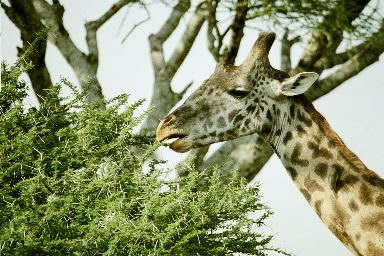
Erasto chided me for feeding the birds with an "I told you so" remark.
I didn't respond with "if you didn't serve such nasty food, I wouldn't
have to creatively dispose of it," because I was too surprised.
I took a second empanada, guarded it carefully, and managed to down
half of it before a kite swooped in low over my shoulder and snatched
it from my hands, held close to my chest. Wilfred lost his sweet pancake in
much the same way, although he may have lost it on purpose so that I wasn't the
only one feeling foolish.
The kites left us for a Barcelona lesbian traveler's club, and we
fled, energized for more game-spotting.
It didn't take long before someone spotted the usual "rock rhino," a
rock formation mistaken initially for a rhino. Other infamous sightings
included the warthog-rhino and the elephant-rhino. Finally, Carl
spotted two dark-gray blotches in the distance, but this time they had horns on
their noses.
"Rhino!" he declared triumphantly. They were, and while they were too
far for a good long look, they geniuinely were rhino and enabled the
group to fulfill its "big five" quotient. I'd been game for substituting
"mongoose" for rhino, as Wilfred explained that mongoose eat snakes who scare lion, so the mongoose was the true king of the jungle.
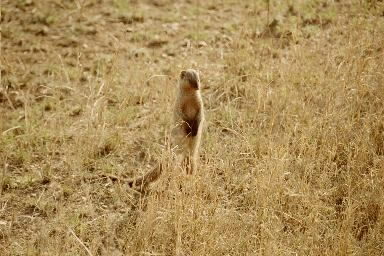 king of the jungle
king of the jungle
I'd had enough now. Animals are great fun to look at, but you have to
ration your time spent on game drives as it is possible to overdose.
I'd been all animaled-out now, and wondered if perhaps a better way to economize my time might be to go to Arusha early to meet up with my friend Paul.
Paul was leading Kilimanjaro trips for a British firm called "Charity
Challenge" (http://www.charitychallenge.co.uk) and was in Arusha until
October 1. If I stuck to my schedule, I'd see him the evening of the 28th. I'd
prefer to spend more time with him, and was thinking of staying an extra day
in Arusha -- but then I'd be cutting into my tight mountain gorillas
viewing/Masai Mara ballooning schedule, and I could potentially miss out on one of them.
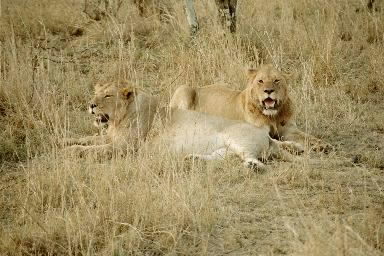
The solution, I decided, was to catch a morning bus to Arusha, spend
the 27th and 28th with Paul, and go with the group to Nairobi on the
29th, where I'd catch an overnight bus to Kampala, Uganda. I could
conceivably see gorillas as early as Tuesday.
"Stop," yelled Charlie, interrupting my planning. "Cheetah!"
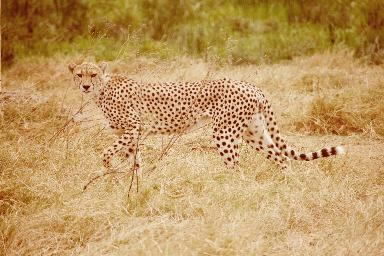
We backed up. A bored cheetah sat up on a mound of dirt next to the
road. He shot us a few glances and then turned his back to us.
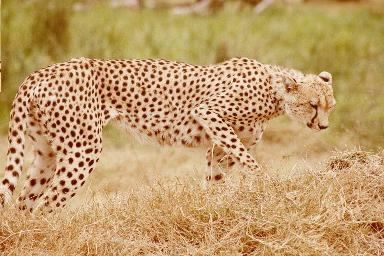
After another circuit to look at more zebra and elephant, we stopped
at a toilet (or washroom, as Tanzanians say).
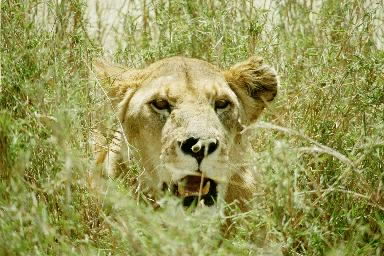
Vervet monkeys infested the parking lot, and kept crawling through
open roofs and into safari Rovers. Tourists would coo and crowd around the
trucks to take photos, leaving the monkeys no escape route. The monkeys became
agitated, ran around the cars wildly, managed to escape, and then approached
other Rovers to begin the fun all over again.

We drove up a dusty, horrendous road out of the crater, passed Simba
Camp, and made our way back to Karatu and Kudu Camp. After Simba Camp
and the pit toilets of the Serengeti, Kudu Camp was real luxury.
KARATU TO ARUSHA
SEPTEMBER 27
Erasto was funny in his concern. He was worried that a taxi driver
might rip me off in Arusha.
"You can take the Nogorongoro Crater bus," he said, "but the taxi ride
in Arusha..."
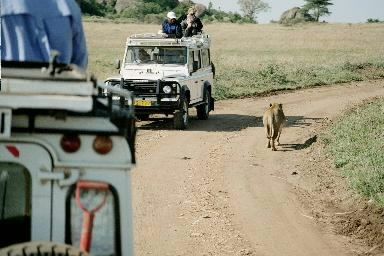
"I know tourist prices," I said. "Don't worry, I've gotten myself this
far. I can catch a taxi."
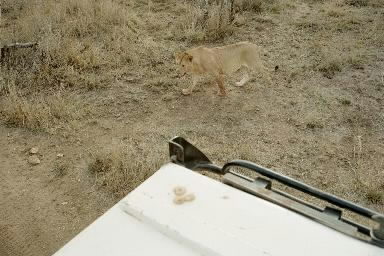
Wilfred put me in his Land Cruiser along with Annete and Jim, and we
drove to a coffee plantation. The group had a look around -- they were
taking a five kilometer walk to Gibb's farm, an upmarket resort where they'd sip good coffee.
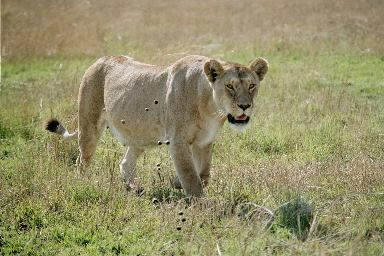
Erasto wanted to personally see me to the bus. He drove me to the
center of Karatu, where the Ngorongoro Crater bus waited.
For three dollars, I got a seat for the hundred kilometer ride to
Arusha. The roads were atrocious -- red dust spewed into our nostrils,
making them orange, and the potholes reminded me of the ones in Cambodia that
were "large enough to park a truck in." But they were the same
uncomfortable roads I'd driven over in the Rover and Land Cruiser. The only
difference was that the Masai standing in aisles kept inadvertantly tossing their blankets in my face while I tried to read a book about China.
The ride took almost four hours. Finally, I got a taxi in Arusha (at
the normal price) and headed to "Arusha Naaz Hotel."
On my frantic search for a decent hotel the last time I'd been in
Arusha, I'd found that "Arusha Naaz" was the nicest cheapie. At $20 a
night, it was far more expensive than the $8-$12 set, but was centrally located. "Mezza Luna" was nicer, but was $35 a night and booked up frequently.
I washed the orange dust from my hands and face and rushed to the
internet cafe to virtually look for Paul.
He'd sent me an e-mail. I replied with my location and he strolled in
the internet cafe's doors ten minutes later.
I hadn't seen a familiar face in a long time and it was great to have
someone around who knew me well and didn't have to ask me where I was
from or how long I'd been traveling. We had coffee and Ethiopian food and
lazily bantered about our future plans, and the future of the world.
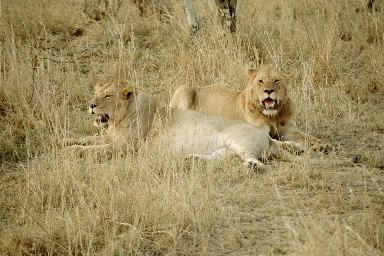
Paul was Nikki's co-driver on my '98 Dragoman trip from Kathmandu to Damascus. Prior to that he'd driven for Guerba. We'd both been new to India and the Middle East, and had bonded enough to keep in touch when our schedules allowed -- which had been three times, once in Oxford, once on the Isle of Wight, and once in California. Paul had found a niche for himself, enabling him to aid society and satisfy his own wanderlust. He alternated taking teens on extended leadership development trips through South America with charity fundraising trips. I, however, was utterly clueless about how to proceed with my life once mariesworldtour.com was over.
We ate dinner, then matched wits with a taxi driver, who begrudgingly
drove us back to our hotels for a slight gouge.
As I walked through the lobby of "Arusha Naaz" hotel, I noticed two
workers staring with fascination at the computer. Glancing over their
shoulders, I saw that they were intently playing and replaying a
"Flash" animated map of the flight paths of the planes that had hit the World
Trade Center. They looked at me, caught my glance, and giggled. I hastily
walked by.
ARUSHA
SEPTEMBER 28
I ran errands, buying film and mailing postcards, and met Paul in the
evening.
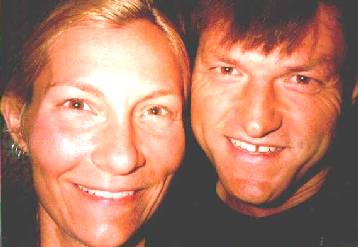 Marie and Paul
Marie and Paul
We ate at "Mezza Luna." The African band played "La Bamba," singing it
in Spanish, not Swahili, and we talked about Paul's Kilimanjaro trips.
"Every time I do it, I think it's the hardest thing I've ever done,"
laughed Paul. I was glad I hadn't tried the climb. If Paul had trouble
making it to the summit, I wouldn't have had a prayer.
ARUSHA TO NAIROBI
SEPTEMBER 29
I caught a taxi, and dropped off the last book I'd read at Paul's
hotel, handing "Wild Swans" to a Masai guard with stretched earlobes.
The taxi left me at "Masai Camp," where I was rejoining my Guerba
group for the ride to Nairobi.
The group had been lucky -- they'd hit Tarangire National Park at
the "no tse-tse fly" time. They'd also spotted two lion cubs.
Two of the group, Lucy and Charlie, had flown on to Zanzibar, so five
of us left the Guerba staff of seven and boarded a "Riverside" shuttle
bus to Nairobi.
The trip took hours, and because there were other passengers on the
bus, we got a special sidetrip to the Nairobi airport.
We were dropped off last after numerous stops, but the impromptu tour
gave me a quick overview of Nairobi. I was surprised at the orderliness
of downtown -- I'd been expecting chaos worthy of the nickname
"Nairobbery."
Guerba uses the "Boulevard Hotel" and gives them a lot of business, so
they were happy to store my spare bag for the week. I tried to call
"Akamba" bus lines to book my ticket to Uganda, but got no response and finally
left my group and caught a taxi to the bus booking office.
Akamba had some bad news for me. Tonight's buses were sold out.
"Are there other buses?" I asked.
"Sure, Busscar."
"What??"
"Busscar."
"Can you write that down please?"
"BUSCAAR, RIVER ROAD."
Off I went to River Road.
"No, that bus is booked from the other office, on Accra Road."
Off again, to delapidated Accra Road which is more a wide dirt alley
than a road. The surrounding buildings featured signs advertising many
different bus lines. A tiny sign down a narrow lane said "Busscar."
"That's it!" I said. The taxi driver stopped and let me out. I bought
a ticket from an Arabic man in a snack shop.
"Where does the bus leave from?" I asked.
"Right here." The man motioned outside the door.
The only problem, I realized was that I'd never find the place again
in the dark. The bus was leaving at 8 p.m.
"I will bring you,' announced my taxi driver. He then dropped me off
at Barclay's Bank, where I delightedly used the ATM to (wow) take funds
directly out of my home checking account.
Later, I left the Boulevard Hotel for the bus station. I looked
uncertainly for my taxi driver.
"Here I am," said a man.
He looked different, but it was dark. But even stranger -- his car was
different.
"Earlier you had a station wagon," I said doubtfully.
"My brother's," he said. Uncertainly, I got in. We left and I listened
carefully for some evidence that I was in the right car.
"Which airline is it again?" asked the driver casually.
I forced him to return me to the hotel. My taxi driver was MIA, but
another man managed to get me to the Busscar stop, and wouldn't leave
until I was safely on the bus. Accra Road at night is not a safe place for
anyone, especially a pale-skinned tourist.
The man who took my ticket issued me some fear-inspiring instructions.
"Remember my face," he said. "Give your bag to no one else."
I boarded the bus. It could have been a lot worse. It was an older
bus, by no means a nice coach, but the seats reclined and I had scored a
back double seat to myself. I was the only non-African on board and caused a bit of a sensation at first. But the other passengers got bored with staring at
me and went about the business of sleeping.
The sleeping didn't last long though. The road deteriorated, and the
bus lurched about all night.
NEXT: Uganda and Kampala on the cheap!